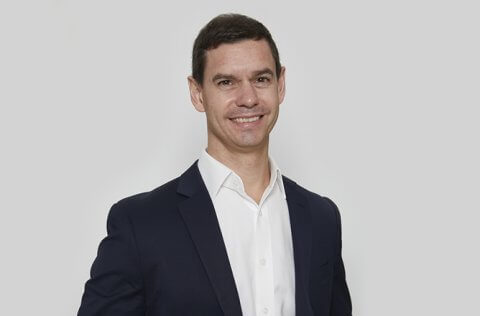CNME Editor Mark Forker spoke to Nicholas Watson, CEO and co-founder of Udrive, to find out how the car-sharing company is completely transforming the mobility sector in the UAE – and its strategy to expand its model across the Middle East region.
Nicholas Watson has cultivated a stellar reputation for himself as a prominent business leader and entrepreneur over the last 20 years.
Watson is an expert in scaling companies in emerging technology verticals like mobility, FinTech and blockchain.
He spent 17 years at Naseba, a platform designed to help businesses navigate their way through emerging markets.
Watson is currently the CEO of Udrive, which is a car-sharing company he co-founded with Hasib Khan in 2017.
Over the last 3 years they have enjoyed phenomenal growth, and in a candid interview with CNME he documents their journey, their evolution as a company – and their plans for the future growth and scalability.
Watson began the conversation by highlighting his belief that mobility is a fundamental human right.
“At Udrive, we believe that mobility is a human right. If you don’t have mobility then you can’t eat, you can’t drink, you can’t do anything, so if you think about it mobility creates these opportunities – and I think that’s where Udrive sits in its core ethos. The major problem with mobility is the fact that it is treated as a ‘nice to have’ instead of a fundamental human right. However, I do think we have now reached this inflexion point where mature Western governments have recognised that they need to get mobility right,” said Watson.
We live in what many are describing as the ‘experience economy’ – and businesses who don’t deliver good experiences won’t survive.
I think it’s fair to say that in Dubai the ‘experience’ when dealing with car rental companies left a lot to be desired.
Interestingly, Udrive started out as a car-rental company, before pivoting towards the car-sharing model.
“We started out originally as a traditional rent-a-car company, in which you rented the car for a month, and customers put down a deposit of 1,000AED for any fines, or penalties so we can recover it if need be. However, there was also the element of checking for damage and charging for damage, even if you weren’t responsible for it, but that’s part of the business model. Every car rental company makes more margins out of the damage than they do out of the rental itself, it’s embedded into their business model to go after your damages. We decided to flip the business, because even though we were profitable, we just weren’t scaling and were not becoming a household name. Our flip from traditional car rental was not just a technology play, it’s an operational play, and a business model play. We removed all the deposits, we included fuel and parking – and we removed all the things that people hated about car rental,” said Watson.
Under the founders’ vision, Udrive decided to digitise their fleet of cars, harnessing the capabilities of IoT and cloud technology to make the cars communicate with each other.
“We essentially took a dumb asset, which is a car, that had no digital nature, and digitised it. Once we digitised the cars it opened up a whole host of opportunities for us. We can track where it is, where it is going, where the journey starts, where the journey ends, who opened the car, where did they take it. You can also secure the car by not having a key, the key is the biggest risk factor primarily because anybody can hand a key to anybody. When you open our car, we know who owns the phone, who the account holder is,” said Watson.
Watson reinforced the importance of security and highlighted the robust security provided by the fleet of Udrive cars.
“Security is critical, but if you want to digitally transfer one key to another then you can do that instantaneously with our tech. However, all our cars are remotely opened, so you can’t get into the car. Now even if someone did break into the car and took the key from inside the dashboard, they can’t start the car because it is completely immobilized,” said Watson.
In another example of their desire to deliver good experiences, Udrive has developed new technology which expedites the approval process involved in acquiring a car from the fleet provided by Udrive.
“One of the big problems of traditional car rental and car-sharing is the speed at which you get approved. In the past, we gave a 4-hour window for approval because we had to manually check your driver’s license. However, with our new technology will approve you in two minutes and you’re driving in your car of choice straight after that,” said Watson.
In addition to this, Watson highlights how it is also the cheapest form of transport in Dubai.
“We are the cheapest form of direct transport in the GCC. A Udrive from Dubai Marina to DXB Airport is 32AED (Compared to taxi which is approx. 85 AED), the only impediment and the only barrier to entry is the fact that you have to have a valid drivers license. You can drive a Nissan Sunny, or a Mustang, the choice is yours and the autonomy and control is in the hands of the end-users, and as I said we are fundamentally cheaper than anybody else,” said Watson.
In terms of the business model, which has evolved over time, Watson described themselves as a ‘financial platform’ – citing its approach as similar to that of Netflix and Spotify.
“The business is a financial platform more than anything. We take a liquid asset like a car, which is typically, and traditionally owned by one person for a couple of years but is only used for around 90 minutes every day. We fractionalise it down to one minute, and we let anybody drive it that has the right to drive it. One car in a traditional world has one driver, but in our world that one car is divided between 80-120 people in a month. An analogy for what we do is like having a very large cake and dividing it into four pieces, but you know you’re going to have a lot of wastage, whereas if you divide it into 100 pieces then you know 100 people can have a taste of the cake. That is what we do, our business model falls into the same category or approach as the likes of Netflix and Spotify,” said Watson.
It has also become increasingly evident that there is a generational shift away from the traditional ownership of assets.
However, as Watson points out, the decision fundamentally comes to down to cost.
“There are two camps of thought here. There is a generational camp, and then there’s the disposal income group. If you’re middle to lower income, no matter what age you are, you can either afford to have a car parked in basement doing nothing for 22 and half hours a day, or you can’t. If you can afford it then you have it, if you can’t afford it then you don’t have it. It makes no sense to own a car if you’re not driving it for more than 2 hours a day, because outside of that you are just losing money. You’re losing money, but you’re happy because it is always available, and you don’t care about 500AED per-month in lost income.,” said Watson.
Watson explained the demographic breakdown of their customer base, with again the cost aspect coming to the fore, when many users realise, they are wasting money on owning a vehicle.
“Our customer base is primarily middle to lower income, and then we have transient groups, which are tourists, and businesspeople coming to Dubai for a week. They don’t need to buy a car to drive around for a week, and they know they are not going to need the car all day, so they can pop into the U-drive app and get approved to get a car to take them to where they need to go. Our age brackets are between 21-32, and then oddly enough it picks up between 38-42. So, what we think we have going on is your younger generation that don’t want to own anything, and just want to be users. They essentially want something different every time they drive a car. People between 32-38 have succeeded in their careers, have disposable income, and want to own an asset. Then a few years into owning that asset they realise what a waste of money this is, they are having kids and realise the money is going into a bottomless pit, and pursue other models available to them, like car-sharing with Udrive,” said Watson.
Watson concluded a great conversation by explaining the differences between their daily and per-minute business models, and the unique details of its partnership with RTA.
“We have two business models. We have our per-minute business, and our daily business. We’re allowed to operate a rental more than one time per-day, now the law in the UAE is 24-hour rental. However, we entered into a partnership with RTA and created a new law, which allows us to rent a car more than once in a 24-hour window. We have what we call a franchise agreement, and we have license which gives us the right to do something that nobody else can do. We see a lot more demand than the existing 200 cars we have operating. The only difference between a daily car, and a per-minute is our ability to cut the cake even more. People will rent the car for a one minute, but then keep it for the day, so it becomes a daily car. The next day it is a per-minute car again for the next 3-4 hours and then locks out at its max amount of money and becomes a daily car again. Per-minute is a better model for mobility in my opinion, the innovation at the minute is outpacing the regulations in place, but I’m confident we’ll get there. If we can get more than 200 cars then our ability to scale expands greatly, and overall, the future is looking very bright for Udrive,” said Watson.





